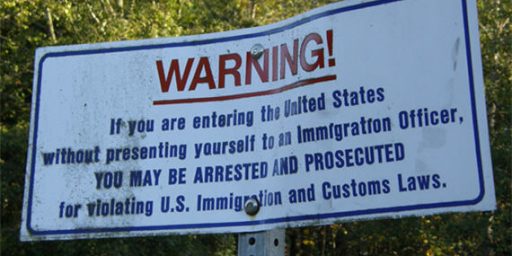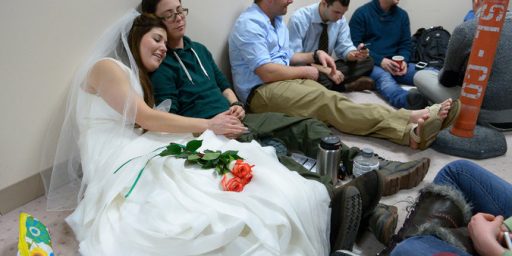Immigration Reform Returning From The Dead?
Could Congress actually pass some form of immigration reform before the midterms? Don't bet on it just yet.
Earlier this wee, I proclaimed immigration reform dead, most likely until some time after the 2014 midterms thanks largely to the fact that the House GOP had pretty publicly decided that they wouldn’t be pursuing anything related to the issue for the remainder of the 19 or so days that they’ll be in session for the rest of this year, and the fact that its unlikely that they’d pursue anything in advance of the 2014 primary elections. Added into that is the fact that the efforts by House Republicans like Bob Goolatte of Virginia and Raul Labrador of Idaho had essentially ground to a halt and the act that if there is going to be legislative action on anything controversial for the rest of the year, it’s going to be related to the budget not immigration.
Despite all of this, though, there are still Republican groups that intend to try to push the caucus to act on the issue sooner rather than later:
WASHINGTON — For the business group from Utah, the lobbying blitz started well before their plane touched down in the nation’s capital.
Heading to Washington to spend Tuesday urging House Republicans to take up a broad immigration overhaul, the team of Utah business leaders buttonholed several members of their state’s congressional delegation — Senators Orrin Hatch and Mike Lee, both Republicans, and Representatives Jim Matheson, a Democrat, and Chris Stewart, a Republican — as the lawmakers waited to board their flight Monday at the Salt Lake City airport.
“Our plea is to act now, do it now, lead,” Stan Lockhart, a former chairman of the Utah Republican Party, said Tuesday in an interview as he explained the group’s basic pitch. “Ask House leadership to lead, and let’s pass what’s possible now.”
Randy Parker, chief executive of the Utah Farm Bureau Federation, chimed in: “They need to act now. That’s the bottom line.”
Mr. Lockhart and Mr. Parker are part of an unlikely coalition of business executives, evangelical groups and prominent conservatives coming together to urge House Republicans to put broad immigration legislation on the House floor, ideally before the end of this year.
On Tuesday, the group of more than 600 leaders from roughly 40 states descended on the Capitol for meetings with nearly 150 Republican lawmakers. They are largely taking aim at House Republicans who they think could support a broad immigration overhaul, including some sort of legal status for the 11 million immigrants in the country illegally. The leaders are urging the lawmakers to take a more proactive role in pushing immigration legislation to a House vote.
“Our fly-in today is about moving votes on the Hill in support of reasonable immigration reform,” Randel K. Johnson, the U.S. Chamber of Commerce’s senior vice president for immigration and labor issues, said in a conference call with reporters. “I’m confident we’re going to move the ball forward.”
The event’s sponsors include the Chamber of Commerce; FWD.us, a political action group founded by Mark Zuckerberg, the creator of Facebook; the National Immigration Forum; and the Partnership for a New American Economy, which is led by Mayor Michael R. Bloomberg of New York, Rupert Murdoch and Bill Marriott Jr.
The effort kicked off in the morning with several panel discussions at the Chamber of Commerce, including one conversation in which the Bipartisan Policy Center, a nonprofit based in Washington, unveiled a new study that found a broad immigration overhaul would help the economy.
Advocates then boarded buses to the Capitol. Members of the group from Utah said that while they believed most of their House lawmakers were largely supportive of at least some form of an immigration overhaul, their goal was to persuade them to get out in front on the issue.
“It’s one thing to be with us,” said Todd Bingham, president of the Utah Manufacturers Association. “It’s another to lead out and actually create dialogue and create discussion and tell leadership in the House that we’re not interested in waiting two years — we need to address this now.”
Greg Sargent also notes that a number of Republican Members of Congress, including David Valadao of California, Ileana Ros-Lehtinen of Florida, and Jeff Dunham of California have signed to a comprehensive immigration reform bill proposed by House Democrats. This causes Sargent to be optimistic about the possibility that something could actually happen on this issue:
In some key respects, immigration reform poses its own unique set of political challenges and conditions — it is not quite as polarizing an issue as, say, Obamacare or even the question of whether to agree to new revenues as part of a budget deal. Major GOP aligned constituencies — the U.S. Chamber of Commerce, evangelicals, high tech and agricultural interests in the districts of House Republicans - want immigration reform. What’s more, there is a built-in incentive for Republicans to put this issue behind them, given the slow forward march of demographic realities.
Also, as longtime immigration operative Simon Rosenberg explains, Congressional Republicans have a long history of working on this issue. And some polls show that even sizable chunks of Republican voters want comprehensive reform, particularly if it is packaged with border security (Republican pollster Whit Ayres’ research, in particular,has shown that even GOP primary voters want action when informed that the other option is the status quo or “de facto amnesty,” as some pro-reform Republicans put it.
Indeed, if there is anything that can make something happen, it’s the possibility that inaction is far more difficult politically for Republicans than many of them (and many commentators) claim. The immigration problem — “de facto amnesty” is not going away. If more Republicans like these three urge action inside the GOP caucus, it’s not impossible that House GOP leaders will allow votes on border security, the Kids Act, or potentially the legalization proposal that Republicans are said to be working on. That could possibly get us to conference.
David Weigel is much more sanguine:
[W]hat about Marco Rubio? Over the weekend, the senator’s spokesman had told Breitbart.com that he favored the passage of “piecemeal” bills in the House, as opposed to some omnibus bill that could be merged with the Senate. [American Conservative Union Chairman Al] Cardenas had called that “unhelpful,” which it obviously was.
“Here’s the nuance,” he said. “The House is still looking forward to the passage of these individual bills, but eventually it’s going to be consolidating them. What some are suggesting is, let’s not wait for all of that to happen, let’s conference with the Senate on each portion. The problem is that the Senate did not pass piecemeal bills. While I can understand the thought process of some that say better to get something than nothing—that might be good in theory—the only way we get to conference is if House passes piecemeal bills, they get to the Senate, they are consolidated. The Senate hasn’t passed any piecemeal bills to conference with the House.”
I asked Rubio whether the Senate might help out the House by passing said bills. “The House needs to act first, and I believe it will,” he said.
So, problem No. 2: Republicans think the president is a bad-faith actor who would ignore the strictures of immigration law like he ignored Obamacare’s troublesome provisions.
“By the time this is passed, when the rules and regulations implemented, this president will have a year or less left in office,” said Cardenas.
In the end, I think Weigel is right to throw some cold water on the enthusiasm that Sargent and other have expressed based on these latest Republican moves. In the end, any immigration bill is going to end up placing a great deal of discretionary authority in the hands of the Executive Branch. While that authority is ultimately exercised by immigration officials at ICE and other agencies, the policies are set from the White House and, right now, the guy living in that building is someone that Republicans don’t really have a great deal of trust for. Talk to many of them about immigration reform and they will point to some of the changes that President Obama has already made under existing law, such as those impacting the children of illegal immigrants, as well as various regulatory changes that have come out of the Administration making changes to the implementation of the Affordable Care Act for evidence in support of their belief that the President will use his discretion to push the new law in a direction that Congress doesn’t intend it to go. One can argue that this distrust of the President is irrational, or a symptom of the Obama Derangement Syndrome that has taken over some segments of the GOP. One could also blame on the President’s long standing failure to develop personal relationships with anyone on Capitol Hill in the manner that Presidents before him like Reagan, Clinton, and Bush 43 did in ways that allowed them to get bipartisan support for some of their biggest policy initiatives. Whatever the reason, though, it’s a political reality and it makes the likelihood of pushing through immigration reform all the more difficult.
The other factor that seems to make any movement on reform in the near future unlikely is the fact that most Republicans in the House don’t really have any incentive to act quickly on this issue. Yes, the rise of the Latino vote is an important issue for the GOP as a whole, but the number of Republican Members of Congress that have to worry about large numbers of Latino voters in their district voting in a General Election is still relatively low. In the meantime, polling continues to indicate that, while some aspect of immigration reform are popular with the public at large, there are others, such as legalization of people who are here illegally, that divide the public to enough of an extent that it isn’t necessarily in their interest to stick their neck out on the issue.
Perhaps I’m wrong. Perhaps we’ll see real movement on this issue after the primary season has passed and Republicans can vote without fear of arousing the kind of opposition of a primary challenger. As I said last week, that’s what happened in 1986. But, then again, Congress was a far different place in 1986.







Dude…where is the “Both Sides Do It” angle?
It’s never wise to use action verbs in sentences with the word “Congress.”
I suspect that the business community knows that the Republican Party is circling the bowl and would just like to get it to pass cheap labor before fades away.
Once again, there are Republicans who cannot count. Why can;t anybody ask them why they are doing such a massive demographic favor for the Democrats with getting anything in return other than cheap labor for the Wall Street class.
It all depends on Boehner. Will he allow a vote on the Senate which might actually pass although there is no guarantee it would receive enough votes from the Republican being held hostage by the Teahardists.
@C. Clavin:
It was here:
Cuz, you know, if only Obama shmoozed a little better the Republicans would have treated him like they did Clinton. So completely buried his Health Care Reform initiative, shut down the government *twice* and for twice as long, engaged in House oversight by shooting pumpkins to prove a slanderous conspiracy theory, and if he had them over for cocktails enough perhaps they’d have even treated him to an impeachment.
Newt and Bill never played golf together did they? Would you want to hang with people who think you are a Kenyan, Muslim, Socialist, lying, egomaniacal sociopath? Plus if you did hang out with him you would likely get the soap in the towel treatment a la full metal jacket when you got back to the house. Rubio and Obama could probably hammer out something on immigration
@superdestroyer: “Why can;t anybody ask them why they are doing such a massive demographic favor for the Democrats with getting anything in return other than cheap labor for the Wall Street class. ”
In the end, the Tea Party really exists to serve Wall St. They’ve not opposed anything that Wall St has wanted or failed to oppose anything that Wall St didn’t want, with the sole exception of immigration reform.
Greetings:
Any word on whether those killed by illegal aliens will be returning from the dead ???
@11B40: And this is why immigration reform is dead.